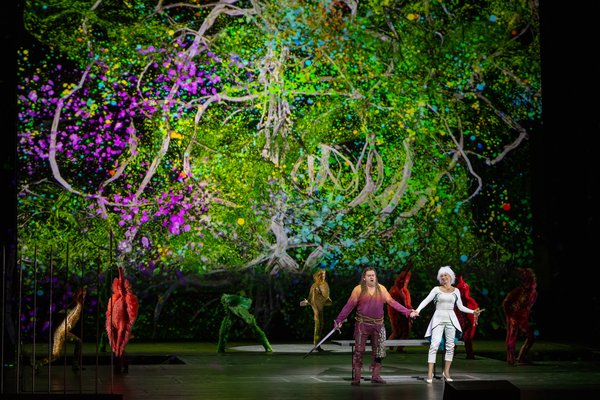
GÖTTERDÄMMERUNG
In Brief
Musical drama in three acts, in German, with Hungarian, English, and German subtitles
We wish to inform you that we occasionally use light effects that may be disturbing or excessively bright for some members of the audience.
Synopsis
Prologue
The Valkyrie’s rock at night. The three Norns, the daughters of Erda, are weaving the rope of destiny. They tell how Wotan ordered the World Ash Tree from which he had carved his spear shaft to be felled and the logs of it piled around Valhalla. The end of the gods’ rule will be marked by this pile set on fire. When they try to find out when that will happen, the rope suddenly snaps. Having lost their wisdom, the Norns return to their underground dwelling. Dawn breaks as Brünnhilde and Siegfried emerge from the mountain cave. After casting a protective spell on Siegfried, the woman lets the restless hero go. Siegfried gives the ring he took from the dragon Fafner to Brünnhilde as a pledge of fidelity, and she offers her steed, Grane to him in return. Siegfried sets out on his journey.
Act 1
Gunther and Gutrune pass time in the Gibichung Hall on the shores of the Rhine. They talk about the decreasing glory of the royal family with their half-brother, Hagen. Hagen advises them to strengthen their power through marriage: he suggests that Gunther take Brünnhilde as his wife, and Gutrune marry Siegfried. As only the greatest hero may pass through the flames surrounding Brünnhilde’s rock, Hagen proposes a bold plan: to use a magic potion that makes Siegfried forget about Brünnhilde and fall in love with Gutrune. But the brother only agrees to the marriage if Siegfried claims Brünnhilde for Gunther. At this moment, they hear Siegfried’s horn from the direction of the river, signalling the arrival of the hero. Everything goes according to plan: Gutrune gives the potion to Siegfried, who is still paying his respects in front of Brünnhilde as he takes the cup, but as soon as he drinks it, he confesses his love to Gutrune. Then Siegfried offers to change into Gunther with the help of Tarnhelm’s transformation magic, and crossing the fire, he claims Brünnhilde for Gunther’s wife. The two men swear a blood-brotherhood and leave. Hagen stays to guard the boat.
Terrified of the approaching end of Valhalla, the Valkyrie Waltraute visits Brünnhilde’s rock to ask for her sister’s help. She tells her that the gods can only be saved if Brünnhilde returns the ring to its rightful owners, the Rhinemaidens. Brünnhilde refuses to do so, saying that Siegfried’s love is more important to her than the fate of the gods. Waltraute leaves in desperation. When she hears Siegfried’s horn in the distance, Brünnhilde is overjoyed. Her happiness soon turns into confusion and terror when a stranger appears in front of her, introducing himself as Gunther, who demands that she marry him and takes the ring from her with force.
Act 2
Night. In the Gibichung Hall. Hagen has fallen asleep while standing guard. His father, Alberich appears in his dream to remind him that he needs to get the ring back. Dawn breaks, and Siegfried arrives. Hagen gathers the vassals of the Gibichungs, who will follow his orders from this point. Gunther and the humiliated Brünnhilde arrive. When she sees Siegfried, she angrily accuses him of betraying her. Still under the influence of the po- tion, Siegfried tells her that he will marry Gutrune, and Brünnhilde is to become Gunther’s wife. Brünnhilde notices the ring on Siegfried’s hand, and wants to know where he got it from, as it was supposed to be Gunther who took it from her the previous night. Brünnhilde accuses Siegfried of stealing the ring, and states that he is her husband. Siegfried objects and swears on Hagen’s spear that he did not do anything against the oath of blood-brotherhood. He rejects Brünnhilde’s accusations and sets off to celebrate with Gutrune and the vassals. Brünnhilde can only think about revenge. Hagen offers to kill Siegfried, but the woman explains to him that the man is invulnerable: she protected him with magic – only his back is unprotected, as he would never turn his back to his enemy. Gunther first hesitates about joining the murderous conspiracy but agrees in the end.
Act 3
Separated from the hunting party, Siegfried encounters the three Rhinemaidens on the shores of the Rhine. They ask him to return the ring to them, and he is about to agree, but when they mention Alberich’s curse, he changes his mind and decides to keep the ring as a proof of his fearlessness. The maidens predict his approaching death, and disappear just as Hagen, Gunther and the other hunters arrive. Encouraged by Hagen, Siegfried talks about his youth: how he lived with Mime, how he forged Nothung, the sword, and how he fought the dragon. While he tells his story, Hagen offers him some wine, which contains the antidote of the potion. Having regained his memory, Siegfried also tells how he crossed the ring of fire to wake Brünnhilde. Upon hearing the girl’s name, Hagen stabs Siegfried in the back with his spear, and tells the shocked Gunther that he avenged the false oath taken by Siegfried. Siegfried utters his last words about Brünnhilde as he dies.
Roused from a bad dream, Gutrune wonders what could have happened to Siegfried. When they bring the hero’s corpse, the girl accuses Gunther of murder, who replies that it was Hagen who committed the crime. The two men start to fight, and Gunther dies. When Hagen reaches for the ring, the dead Siegfried forbiddingly raises his arm, and Brünnhilde enters the hall. Hagen cannot get to the ring. The former Valkyrie orders to have a funeral pyre built on the shores of the Rhine for the hero. She blames the gods for Siegfried’s death. She bids farewell to her father, Wotan, and then she takes the ring from Siegfried’s hand and promises to give it to the Rhinemaidens: after they perish on the pyre, the Rhine gold will be returned to them. Then she lights the pyre and leaps into the flames. The flooding river destroys the hall, and Hagen tries to catch the ring, only to meet his end accompanied by the joyful laughter of the maidens. The gods and the burning Valhalla are seen in the distance.
Gallery
Reviews
"(...) it seemed certain that Götterdämmerung would also offer a lot of new and interesting things, while serving Wagner's statement of the art at the same time with the right tools. And so it happened."
Dr. Klaus Billand, Opernmagazin
